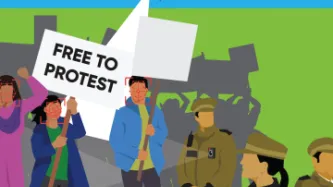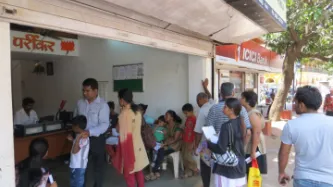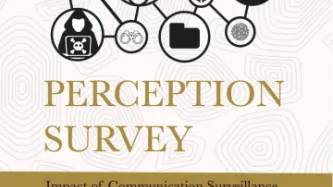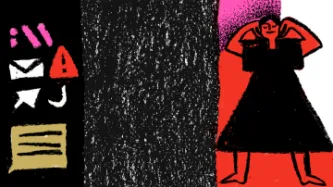Search
Content type: Examples
A former TikTok moderator in Kenya has threatened a lawsuit against TikTok's owner, ByteDance, alleging that he has developed PTSD as a result of his work for the company and that he was unfairly dismissed for advocating for better working conditions. In a letter, his lawyer alleges that the job required him to watch 250 to 350 videos per hour, the vast majority of them "horrific in nature".https://time.com/6293271/tiktok-bytedance-kenya-moderator-lawsuit/ Publication: Time MagazineWriter…
Content type: Report
The methodology employed for this report consists primarily of in-depth interviews held with grassroots political workers and representatives of collectives. The researchers interviewed 14 individuals from various social justice causes such as womens’ rights, climate change, transgender rights, students’ rights and the right to universal internet access in Pakistan. The experiences they have shared with the interviewers along with the real-time developments in the country’s law and order…
Content type: Explainer
The Free to Protest Guide Pakistan has been created by adapting Privacy International's (PI) Free to Protest Guide UK according to the laws and policies of Pakistan, in collaboration with PI and local activists in Pakistan.The Guide has been published in English, Urdu, Punjabi and Pashto.DISCLAIMER: This guide forms part of PI's global work to highlight the range of surveillance tools that law enforcement can use in the protest context, and how data protection laws can help guarantee…
Content type: Examples
Behind every powerful AI system are huge numbers of people labelling and clarifying data to train it, contracted by companies like Remotasks, a subsidiary of Silicon Valley-based data vendor Scale AI, whose customers include the US military and OpenAI. Often the workers, who are assigned tasks they don't understand for a purpose they don't know, are sworn to secrecy. Yet labelling is crucial; it can make the difference between a car stopping to spare the person walking a bike across the road or…
Content type: Examples
More than 150 workers employed by third-party outsourcing companies to provide content moderation for AI tools on Facebook, TikTok, and ChatGPT depend have pledged to create the African Content Moderators Union. The move to create such a union began in 2019 when the outsourcing company Sama fired Facebook content moderator Daniel Motaung for trying to form a union. https://time.com/6275995/chatgpt-facebook-african-workers-union/Publication: TimePublication date: 2023-05-01Writer: Billy…
Content type: Examples
Four people in Kenya have filed a petition calling on the government to investigate conditions for contractors reviewing the content used to train large language models such as OpenAI's ChatGPT. They allege that these are exploitative and have left some former contractors traumatized. The petition relates to a contract between OpenAI and data annotation services company Sama. Content moderation is necessary because LLM algorithms must be trained to recognise prompts that would generate harmful…
Content type: News & Analysis
Privacy International (PI) is concerned by developments in Pakistan regarding the enactment of the Draft Personal Data Protection Bill, 2023 and the opaque process which will see the bill become law.
The Bill was published on 19 May 2023 by the Ministry of Information Technology and Telecommunication ('MITT'). However no open and inclusive consultation was open for comments to be submitted to the MITT. In a concerning development it was reported that the Bill was approved by the Federal…
Content type: News & Analysis
In a ruling handed down on 14 October 2021 by the High Court of Kenya in relation to an application filed by Katiba Institute calling for a halt to the rollout of the Huduma card in the absence of a data impact assessment, the Kenyan High Court found that the Data Protection Act applied retrospectively.
Background to the case
Huduma Namba as initially proposed
In January 2019, the Kenyan Statute Law (Miscellaneous Amendment) Act No. 18 of 2018 came into effect, introducing a raft of amendments…
Content type: Long Read
This piece was last updated in June 2021.
In many countries, access to social protection (such as welfare programmes or healthcare) is made conditional on producing a form of identification (“ID”). But obtaining a recognised and accurate ID is often a process riddled with discriminatory designs, bureaucracy and technical failures that prevent individuals from accessing the services they are entitled to. Even when people eventually get an ID, it might not accurately reflect who they are,…
Content type: Report
Human rights defenders across the world have been facing increasing threats and harms as result of the use of digital and technological tools used by governments and companies which enable the surveillance, monitoring and tracking of individuals and communities. They are continuously at risk of violence, intimidation and surveillance as a direct consequence of the work they do. Such surveillance has been shown to lead to arbitrary detention, sometimes to torture and possibly to extrajudicial…
Content type: Video
You can listen and subscribe to the podcast where ever you normally find your podcasts:
Spotify
Apple podcasts
Google podcasts
Castbox
Overcast
Pocket Casts
Peertube
Youtube
Stitcher
And more...
And support PI's work here: support.privacyinternational.org
Content type: Examples
TrustNet Pakistan, the country’s only digital trust foundation, has begun work alongside many other global technology companies on a digital vaccination verification platform called CovidCreds. The initiative supports projects that use privacy-preserving verifiable credentials. TrustNet is working on a solution called Vaccify to provide verification that it’s safe for people to travel out of Pakistan. The system is expected to work via a mobile phone app that can digitally receive test results…
Content type: Examples
Kenya’s Independent Policing Oversight Body reports that it received 87 complaints covering 31 incidents in which injuries were linked to the actions of police officers and 15 deaths between curfew’s imposition on March 27 and June 5. In April, Human Rights Watch accused the police of brutality in imposing the curfew from the beginning, including whipping, kicking, and teargassing people.
Publication: Guardian
Publication date: 2020-06-05
Content type: Examples
A detailed analysis of Pakistan’s app, which was developed by the Ministry of IT and Telecom and the National Information Technology Board and which offers dashboards for each province and state, self-assessment tools, and popup hygiene reminders, finds a number of security issues. Among them: the app uses hard-coded credentials, which it sends insecurely, to communicate with the government server, and it downloads the exact coordinates of infected people in order to provide a map of their…
Content type: Examples
The lack of data protection laws and the absence of a privacy commission are contributing factors to Pakistan’s failure to investigate or remedy security flaws in the country’s recently-launched COVID-19 tracking technology, which partially depends on a system originally developed to combat terrorism. While there are no reported cases of harassment or targeting based on the leak online of the personal details of thousands of COVID-19 volunteers, the lack of response fails to boost citizens’…
Content type: Video
You can find out more about Haki na Sheria here: http://hakinasheria.org/
Find out more about double registration in Keren's piece "In Kenya, thousands left in limbo without ID cards" in CodaStory: https://www.codastory.com/authoritarian-tech/kenya-biometrics-double-registration/
Find out more about the Huduma Namba case on our website: https://privacyinternational.org/news-analysis/3350/why-huduma-namba-ruling-matters-future-digital-id-and-not-just-kenya
You can listen and…
Content type: Examples
As the first confirmed coronavirus case in Pakistan, Yahyah Jaffery became a pariah after his identity, photograph, and home address were leaked on social media. Similar leaks about dozens of other patients and medical staff followed. The contact tracing system being used for coronavirus was originally developed by the country's Inter-Service Intelligence (ISI) to combat terrorism; it is based on a new data hub in Islamabad that will collect information from the ISI tracking system and share…
Content type: Examples
Our partners from Digital Rights Foundation in Pakistan wrote a piece analysing cases of privacy violations, misinformation, hate speech and other cases. As they said, the situation with regards to the Coronavirus is still developing in the country and Digital Rights Foundation, are keeping an eye out for the developments regarding the disease and also assessing how the digital rights sphere is being affected.
Link: https://digitalrightsfoundation.pk/protecting-your-digital-rights-during-the-…
Content type: Examples
From our partners from the Defenders Coalition: The civil society’s Police Reforms Working Group, comprised of twenty national human rights organisations, condemn the unnecessary and excessive use of force by Kenya Police Service officers yesterday at the Likoni Ferry Crossing, Mombasa. The police actions completely betrayed the specific responsibility bestowed upon them by the President; to facilitate orderly passage of commuters on the Likoni crossing.
Link to their reaction: https://…
Content type: Examples
The Pakistani government has repurposed a system designed by the country's spy agency, inter-Services Intelligence for tracking down terrorists to trace suspected COVID-19 cases. Prime minister Imran Khan has said that efficient tracking and testing of coronavirus-infected people is the only way to reopen the country's closed businesses.
Source: https://www.indiatoday.in/world/story/pakistan-government-isi-system-track-suspected-covid-19-cases-pm-imran-khan-1670378-2020-04-24
Writer: Press…
Content type: Case Study
The run up to Kenya’s 2017 elections was extremely tense. Kenya has a history of violently fought elections and there was fear this election would be no different. It was in this tense environment, that companies like Cambridge Analytica and Harris Media – and their digital offerings - got involved in the election campaigns.
Cambridge Analytica’s business model is by now familiar, they compiled a huge amount of data points, often through illegal means, to create profiles on individuals –…
Content type: Examples
An Excel file containing complete data pertaining to patients tested for coronavirus in the cities Quetta and Taftan in the the Balochistan region of Pakistan has been circulating in WhatsApp groups about Balochistan. The file contains information such as names, phone numbers, age address and other identifying information for the patients. The leaked data puts the patients at risk of personal harm and social stigma, even after recovery. Balochistan government officials say the data leaked…
Content type: Examples
In order to enforce mandatory 14-day quarantine orders, Kenyan authorities have been tracking mobile phones of people suspected to have COVID-19. Also in Kenya, police enforcement efforts have led to several deaths: three died of injuries from being beaten, one, a 13-year-old boy, was hit by a bullet.
Source: https://www.bbc.co.uk/news/world-africa-52214740
Writer: Dickens Olewe
Publication: BBC News
Content type: Examples
An official directive from the Pakistani provincial government of Sindh titled "COVID-19 Mobile Registration System for Needy People" describes its use of multiple databases to identify those in need of welfare funds and disburse cash to them by combining taxpayers' data from the Federal Board of Revenue, travel histories from the Federal Investigation Agency, and financial information from the State Bank of Pakistan. Recipients need to create cellphone accounts via the service provider Jazz in…
Content type: Examples
Mobile phone users in Pakistan have discovered that the government is accessing, without consent, their mobile phone location and call records despite legal questions about whether doing so violates the country's constitution. After users reported that patients testing positive for COVID-19 returned home, the government sent SMS "Karuna Alert" messages to some of their friends, family, and neighbours; the Pakistan Telecom Authority confirmed it had sent the messages using patients' registered…
Content type: Examples
After Pakistani residents queried whether messages labelled "CoronaALERT" sent out via SMS were legitimate, telecom authorities confirmed that it was authentic, being sent to selected individuals at the request of the Ministry of Health under the Digital Parkistan programme. Individuals were chosen because they might have come in contact with infected individuals during travel or in specific locations. It is not clear, however, what the criteria were for selecting individuals at risk,…
Content type: Long Read
Background
Kenya’s National Integrated Identity Management Scheme (NIIMS) is a biometric database of the Kenyan population, that will eventually be used to give every person in the country a unique “Huduma Namba” for accessing services. This system has the aim of being the “single point of truth”, a biometric population register of every citizen and resident in the country, that then links to multiple databases across government and, potentially, the private sector.
NIIMS was introduced…
Content type: News & Analysis
On 30 January 2020, Kenya’s High Court handed down its judgment on the validity of the implementation of the National Integrated Identity Management System (NIIMS), known as the Huduma Namba. Privacy International submitted an expert witness testimony in the case. We await the final text of the judgment, but the summaries presented by the judges in Court outline the key findings of the Court. Whilst there is much there that is disappointing, the Court found that the implementation of NIIMS…
Content type: Advocacy
We welcome the effort by the Government of Kenya to give life to and specify the right to privacy, already enshrined in Article 31(c) and (d) of the Constitution of Kenya by proposing a draft Data Protection Act. We particularly appreciate the direct reference to this Constitutional right in the purpose of the Act and the way it is referred to on several occasions in the Act.
While these efforts have positive intentions and we are pleased that Kenya has adopted a comprehensive data protection…
Content type: Case Study
On 3 December 2015, four masked men in plainclothes arrested Isnina Musa Sheikh in broad daylight (at around 1 p.m.) as she served customers at her food kiosk in Mandera town, in the North East of Kenya, Human Rights Watch reported. The men didn’t identify themselves but they were carrying pistols and M16 assault rifles, commonly used by Kenyan defence forces and the cars that took her away had their insignia on the doors. Isnina’s body was discovered three days later in a shallow grave about…










